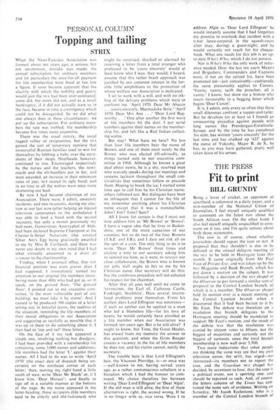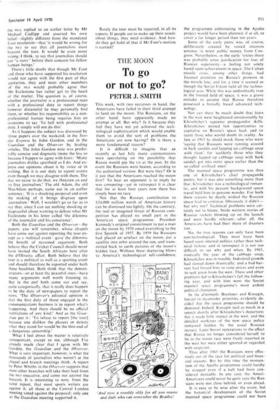THE PRESS
Fit to print
BILL GRUNDY
Being a lover of cricket, an opponent of apartheid, a columnist in a daily paper, and a rion-member of the National Union of Journalists, I feel myself uniquely qualified to comment on the latest row about the South African tour. On the other hand, I also feel myself uniquely unqualified to com- ment on it too, and I'm quite serious about both those statements.
The row is, of course, about whether journalists should report the tour or not. A proposal that they shouldn't is due to be debated at the annual delegate meeting of the NUJ to be held in Harrogate later this month. It came originally from Mr Paul Foot of Private Eye, and was taken up by the NUJ Magazine and Book Branch, which has put down a motion on the subject. It was followed by a decision of the NW chapel of the Observer to put forward a similar sort of proposal to the Central London branch, of which it is a member. The Observer chapel held its motion over at a recent meeting of the Central London branch when it discovered that it had been beaten to it by Mr Foot. The debate was therefore on a resolution that branch delegates to the Harrogate meeting should be mandated to support Mr Foot's motion, and the result of the debate was that the resolution was carried by sixteen votes to fifteen, not the biggest of majorities and certainly not the biggest of turnouts, since the total branch membership is now well over 3,500.
Two more indications that other people are thinking the same way are that my own television union, the Ac-rr, has urged—not instructed—its members not to report the tour, and the Guardian NW chapel has decided, by seventeen to four, that the tour is a political event, not a sporting one. and should be reported as such. And, of course. the letters column of the Times has con- tained the same sort of evidence. Writing on Saturday, Mr Jacob Ecclestone, who is a member of the Central London branch of the mu, replied to an earlier letter by Mr Michael Cudlipp and asserted his own belief—slightly different from the mandated Foot resolution—that 'it would be wrong for the NW to say that all journalists must boycott the tour. It would be even more wrong, I think, to say that journalists should put "a story" before their concern for fellow human beings.'
There's little doubt that though Mr Foot and those who have supported his resolution would not agree with the first part of that quotation, they and most other members of the NW would probably agree that Mr Ecclestone has rather got to the heart of the matter. The question is, of course, whether the journalist is a professional man with a professional duty to report things however distasteful he may personally find them, or whether his responsibility as a non- professional human being requires him on occasions to say To hell with professional duty. I simply will not do this'.
As it happens the subject was discussed by three papers over the weekend; in. the Sun- day Express by John Gordon, and in the Guardian and the Observer by leading articles. The John Gordon note was predic- tably concise and dogmatic (none the less so because I happen to agree with him): 'Many journalists dislike apartheid as I do. And ex- press our opinions about it by voice or in writing. But it is our duty to report events even though we may disagree with them. The day we cease to do that, we threaten an end to free journalism.' The old Adam, the old MacAdam perhaps, came out in an earlier sentence: 'It is a shocking proposal and even the making of it brings disgrace upon journalism.' Well, I wouldn't go so far as to say that, since I can see nothing shocking or disgraceful about wanting to debate what Mr Ecclestone in his letter called 'the dilemma of the journalist and his conscience'.
Both the Guardian and the Observer—the papers, you will remember, whose chapels have come out against reporting the tour ex- cept as a nolitical event—gave the dilemma the benefit of reasoned argument. Both believe that the Cricket Council should never have invited the South Africans here after the d'Oliveira affair. Both believe that the tour is a political as well as a sporting event and should therefore be reported under both these headings. Both think that the demon- strators—or at least the peaceful ones—have many arguments well worth listening to. But in the end both come out and say, quite categorically, that it really does happen to be the duty of newspapers to report the news. 'The Observer's editorial opinion is that the first duty of those engaged in the communications business is to report what's happening. And there should be no official restrictions of any kind.' And as the Guar- dian put it: `To refuse to report [the tour] because one dislikes the players or detests what they stand for would be the thin end of a dangerous censorship.'
What I feel about the matter is relatively unimportant, except to me, although I've already made clear that I agree with Mr Gordon, the Guardian and the Observer. What is very important, however, is what the thousands of journalists who weren't at the chapel and branch meetings think. A report by Peter Whitby in the Observer suggests that most other branches will take their lead from the NW executive, and come out against the boycott. It is interesting to note, from the same report, that most sports writers are against it; all those at the Central London meeting voted against the proposal; only one at the Guardian meeting supported it.
Surely the tour must be reported, in all its aspects. If people are to make up their minds about things, they need evidence. And how do they get hold of that if Mr Foot's motion is carried?







































 Previous page
Previous page